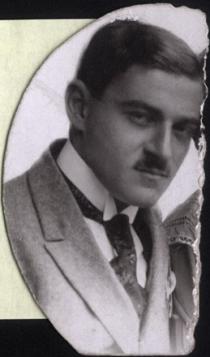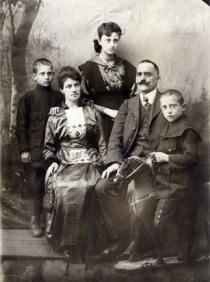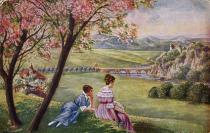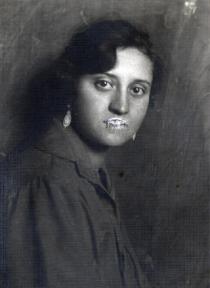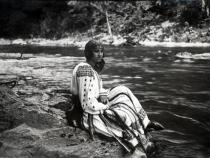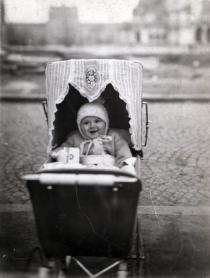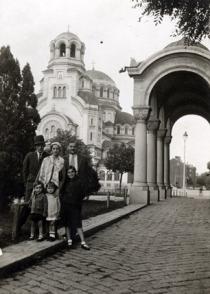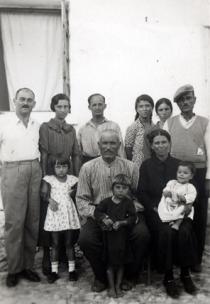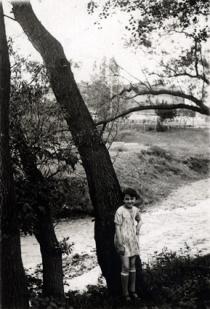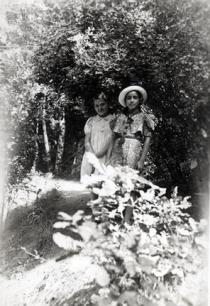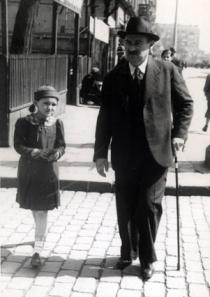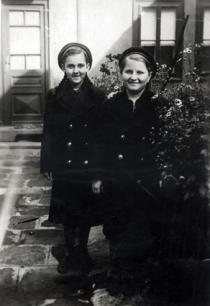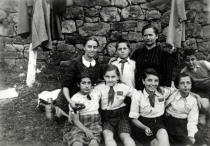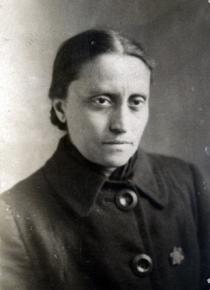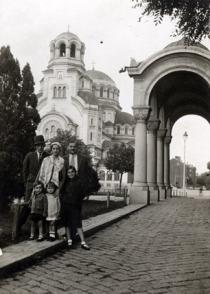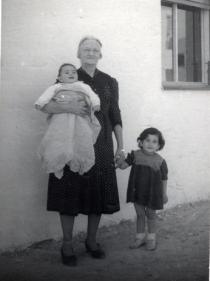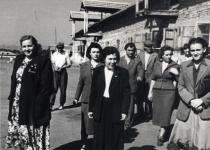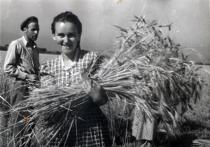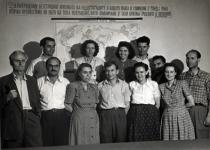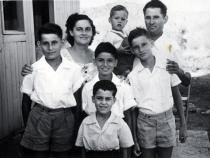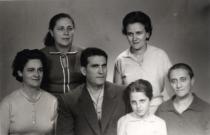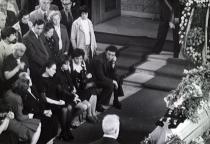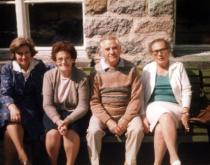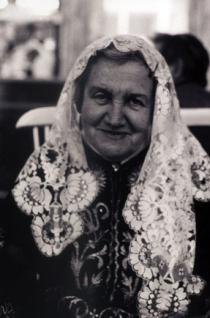This is my mother Elvira Lidgi. Eleven days after the wedding on a honeymoon in Romania and Hungary. She is wearing a Romanian traditional costume. On the back of the photo there is an inscription in ink probably done by Elvira herself:
‘I am 21 years, 11 months and 23 days old - Romania - Hungary. / 12th June 1924
11 days after the wedding - Hercules Bad [Baile Herculane spa], the Cerna River. So happy moments from my new life. Doubt is rising in me. Will these so happy and unforgettable days continue? ‘
My mother used to worry a lot. One day she told me ‘Stop telling me not to worry. It won't be me if I stop worrying.’
My mother, Elvira Isak Lidgi (nee Beniesh) was born in Vidin on 18th July 1902 and died in 1990 in Sofia. She used to like Mathematics very much. She finished her secondary education in the Second Girls' High School in Vidin and later, when she was already married, attended a free university in Sofia but she didn't finish her studies at the insistence of her husband. I can't say what his motives for that were. She used to go to the synagogue regularly and she kept the rituals. She was a beauty, too, with a very stately figure, but she was extremely depressed after her mother's death and was very devoted to her two brothers, and most of all to Mois Beniesh [later a famous theater director].
My mother told me that in order to get separated from the heavy atmosphere in the family in the 1920s, she went to visit a distant relative from grandpa Itzhak's kin, whose name was Tiyasumha. She lived in Vidin. In the house next door lived my father's family. At that time he was in Switzerland but had come back to ask permission from his parents to propose to a Swiss girl. He saw my mother and some emotions arose in him. He felt attracted by her modesty, by her unostentatious presence. He went back to Switzerland but his desire to marry the Swiss girl had faded. He started writing letters to my mother all the time but she didn't respond because, at the beginning, she had a friendship with a Bulgarian man. His name was Stephan. At a certain moment there occurred some cooling in the relationship caused by the boy - a Bulgarian and only then did my mother write to my father that she was ready to accept his proposal. My father had proposed on several occasions in his letters but she rejected him, he even had a very valuable ring, which he wanted to give her. My mother didn't accept it because she was very proud and considered this as a kind of commitment. This ring used to be something really remarkable, but unfrotunately it was stolen from him in Romania. So they got engaged regardless of her difficult financial situation. She didn't even have a dowry - ashougar. They managed to get engaged - the engagement took place on 3rd September 1923.
My father came to ask my mother's hand from grandfather Isak in their house in Sofia exactly when the September Rebellion started [in 1923]. And the two of them spent the night by the window because at that time there was unrest in Sofia. In fact, my father spent the night in the home of the Beniesh family. This is a story that my mother has told and I can't give any more details, nor do I remember whether my mother has ever told me more about the September Rebellion. (The date fixed for the wedding was 1st June 1924. So, these nine months were a period of cooing, obviously. My father used to work in Vidin. And then began the agony of preparing the dowry - ashougar. I don't know what exactly the dowry used to be and what it had to consist of.) [Ashougar or the dowry of the Jewish girl consists of: six sets of bed sheets and pillow-cases, decorated with hand-made embroidery, a special chemise for the first matrimonial night, garment, secular, and for keeping Sabbath as well, bought by the bride's parents. The well-to-do families used to buy a bindali dress, which Reyna has mentioned; there was also the so-called 'djura' - a counterpane whose knitting patterns were given from mother to daughter and the very start of the knitting was to be performed in secret by an owner of an already made 'djura', a counterpane for a woman in child-birth.] Aunt Sulcha - granny Sarah's older sister used to be very rich and she had promised to send out the dowry for Elvira. And there comes a big parcel, they open it and what do they see - old underwear, old chemises. This is the way a rich aunt treats her poor niece. My mother, as I have already told you, was very proud. She hires a seamstress, they repair everything, put the things in a parcel and send it back to aunt Sulcha with a letter, which says 'You have another daughter, you may need this.' But after all, there were some things left from granny Sarah. [The dowry was an important thing at that time as the tradition was to spread it on the fence so that everybody could see that the daughter-in-law was wealthy. My mother pulled her weight together and prepared her dowry alone. I still keep some parts of her dowry - a counterpane decorated with typical Bulgarian embroidery, garnish for a woman in child-birth - a silk cloth with hand-made embroidery, the bindali dress… probably there were more things but I don't know what happened to them. So my mother exhibited some dowry. My father, on the other hand, gave 1, 500 leva to grandfather Isak, so that he could give them as a dowry to his daughter.
They married in 1924 in Vidin. According to a story my mother told she didn't have her own wedding dress. They borrowed it from Auntie Lizi, wife of a cousin of my father. His name was Izidor Lidgi. At the moment when some photographs of the bride and the kin were being taken, my father's siter Rashel, accidentally or on purpose - I don't know - stepped on the veil and it was torn. They found another veil but my mother's white stocking ran a ladder, then somebody spilled something on the bride's dress and it had to be washed quickly. So, my mother set off for the synagogue in Vidin with a ladder on her stocking and a wet dress. The procession was followed by music performers. After the wedding, the family spent some time living with granny Reyna in Vidin but due to the tension, which arose between mother and daughter-in-law, my father decided to leave for Sofia with his wife in 1925.

